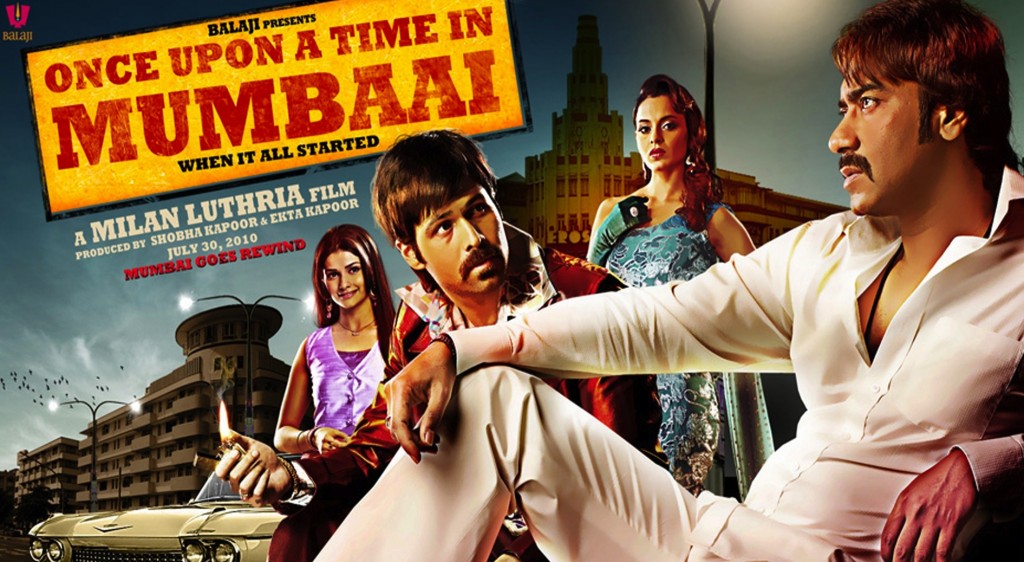Milan Luthria takes a shot at immortality in creating an urban legend on the origin of the word ‘supari’, as the young Dawood, sorry, Shoaib takes his first job as a hitman and promises the betel-chewing client that delivery of the nut is proof of the job done. Once Upon A Time In Mumbaai, the highly romanticized telling of the rise of Haji Mustan and Dawood Ibrahim is replete with such creativity – mostly to do with Kangna Ranaut’s myriad hairstyles – and its dialogue so infused with metaphors, it’s like Shakespeare with logorrhea. Ha.
There is no question that the final bound script presented by Rajat Aroraa must’ve been a real inspiration for all involved – actors, producers, the creative crew. The one-liners, the seamless interweaving of the love angles in a hardcore gangster genre film, the song situations, the choices made with structure… outstanding. Even more galvanizing for the crew would’ve been the music – all that was left to do was shoot the damn thing and create a memorable film. A certain hit.
Luthria, however, falters with the direction. He is just in such a tearing hurry to tell us the dizzying story of the rise and fall of Sultan Mirza (Ajay Devgn) and the rise and rise of his protege Shoaib (Emraan Hashmi) – what with the inane one-liner upon one-liner – that he doesn’t take a breath for the audience to appreciate the world he attempts to create. Because the film stays so close to its characters, there is precious little else to look at. Take for example the production design – we see evidence of the 70s – cars, currency, clothes – but there are no cityscapes (cheating the Marine Drive at night doesn’t count), exterior establishing shots, or any little touches that are not on the character. Instead we’re presented with locations that we’ve seen in many other films, simply redressed a little. For people who watch Bollywood films all the time, this is a major letdown. And those who are not familiar with India were to see this film, they’d not think it as a period movie, but rather a representation of how India might be now. It’s hard to dissect the good bits from the average because each scene is an event by itself and as you’d expect, not all hit a high.
The film is heavily dependent of the chutzpah of the actors. Devgn delivers with a restrained ferocity. His double-edged character – one of a smuggler who lives the high life and the other, gentler side which only looks to be blessed by Mumbai’s poor – is author-backed. Emraan Hashmi however fails to evoke an echo of Dawood. His anti-romantic scenes (I say ‘anti’ because of its priggishness) do work in a unnatural sort of way. But he is much too straight-faced much too often. Kangna Ranaut’s screen presence overwhelms her shifty dialogue delivery and Prachi Desai is more than serviceable in her over-sized suits.
The film comes up a little short technically. The shot-taking is average. There are no distinctive, extraordinary eye-popping shots. Sure, the lighting and colors have a hint of retro, but the camera remains uninspired. The last shot is fun though and captures the spirit of the film wonderfully. The background score stands out with its intentional over the top instrumentation and catchy riffs. It’s the rare case where in-your-face music actually enhances drawly scenes.
The obvious comparison for Once Upon A Time In Mumbaai would be RGV’s Company, and unfortunately it doesn’t quite reach the standard that one sets. But surely fans of the genre will love it and it will almost certainly do well at the box-office. Good news for producers Balaji who, after LSD and this one, seemed to have found their calling in unconventional cinema.
Hindi, Action, Drama, Color


